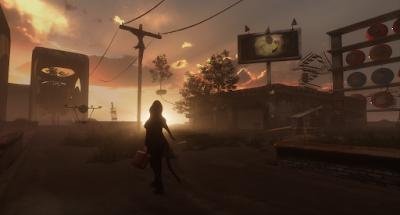PTSD for United States Military - AVESS
 |
| Bridge up to the sandbox |
 |
| Imogen makes an appearance |
 |
| Orientation and presentation area |
In nature the vast majority of creatures never fight to the death. They fight to show superiority and dominance with the challenger slinking off after defeat. Much of it is posturing in the form of threatening actions or roaring and if that fails then there is a physical confrontation that very very rarely results in death. It is just not part of nature for the overwhelming majority creatures on this planet. I think human nature is similar, that we instinctively resist killing another human. We can be trained to overcome this though through various ways that dehumanize the opponent. A good test is to find the cutest 4 year old child you know and then watch tv or play a video game with them. We are desensitized to the violence, but when you have a child with you it makes you actually see it again through fresh eyes. What happens is you become very familiar with the pause button as you anticipate the endless violence that we are so used to but would be shocking for a child to see. Children are so innocent and beautiful, and it is the progress through society and its current culture that, over time, shapes them as adults. Personally I kind of prefer to spend my time around children and animals over the average adult. I remember reading all the negative stuff around Michael Jackson. How the papers would insinuate or blatantly characterize him as a weirdo for using some of his vast wealth to build a theme park for children. To have monkeys and things. I would read those and at the time I wouldn't really know what to make of it, but now I am like... yes I totally get that. To watch children freaking out with excitement and pure joy rather than deal with the human snakes that probably surrounded him in his business life. The media and everything. Anyway I digress.
 |
| Fish from fishing game |
Hollywood and movies in general makes killing look easy, the more indifferent a hero is when he kills a bad guy the better. Some even have witty comments to make after they kill someone. My favorite was Arnold Swartzenegger holding someone by the ankle over a cliff in some movie. He comes back to another character who asks "What did you do with him?" And Arnold replies "I let him go". The truth is that the directors, screenwriters and so forth who show us how easy it is to kill in a movie is much like a virgin writing a book on how to have great sex. Holding a 220 pound bad guy over a cliff by the ankle?... seems plausible. And we would say.. oh it's just entertainment nobody actually believes that stuff. Sadly, the truth is it still shapes us. Probably very minimally and gradually but it adds up. Hey I like games that blow things up and movies that blow things up too. That doesn't mean I have to blindly defend them rather than recognize the possibility that they shape our society along with many other things. Shaping and then the task of unshaping which is much more difficult.
In a fighting environment being killed and killing are both fears, and so there are various ways to look at the trauma of war for a soldier. I spoke to various soldiers during the creation of this work and some of the things they wanted was pretty interesting. One, for example, wanted to simply be able to write things down that happened to him and to place them in a stream so they would float away. Some notes he said he would like others to be able to read.. while others he wished would sink and disappear never to be read by another soul.
Ok back to my scenario. So this young soldier, from a small town of 3000 in Idaho, loses his legs to a roadside bomb. He survives and spends a year in hospital in Boston. He has a psychologist and eventually goes home to stay with his parents. His high school friends come to visit but that slowly dwindles because neither are the same anymore. Nobody around him, including his parents, understand completely what he went through or how he was shaped. The brotherhood or team is gone and everything is completely different. His mind is conditioned and breaking out of the conditioning is quite difficult for some.
The idea behind this work was to help the soldiers learn how to do things we take for granted, but can be difficult for them just from inexperience or effects of PTSD. Things like planning a camping trip.. to go to a few different stores in the virtual environment to buy a sleeping bag, a tent, a fishing rod, bait, a hat and so on. A hud tracks the objectives and goals and sends the information to the professionals he is working with. Another objective might be to follow a shopping list for food.. and instead of plain white rice there is just brown rice on the shelf. Simple? well no. Or perhaps the list of food has been collected in a shopping cart, and then upon arriving to the cash register to pay there is suddenly a spill of milk on the floor and an employee blocks the way while mopping it up. Ways to deal with frustrations. The psychologist from Boston can now meet up with the soldiers in the virtual space. There is no distance to overcome.
The first environment is made up of an orientation sim that teaches the user how to navigate and do various things. There is a quaint little village with various stores brimming with products to buy. There is a lake where they can ride boats and we even created a fishing game from scratch with various rare ones to catch etc. There is also a sandbox region where I have made a bunch of things to assemble like a giant robot spider or go carts. There are presentation areas with seating and so on and so on.
 |
| Bryn avatar on left and Cica on right |


Comments